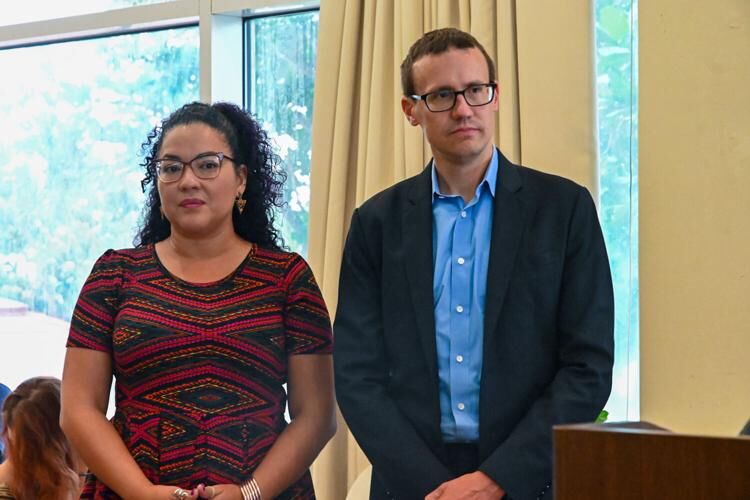HAGÅTÑA (The Guam Daily Post) — Right to Democracy, an organization focused on confronting colonialism in the U.S. territories, held its launch event here on Aug. 28 at the Hilton Guam Resort & Spa.
The organization was co-founded by Neil Weare and Adi Martínez Román, who have pursued initiatives related to decolonization and self-determination, but from different perspectives.
Weare, an attorney and former Guam resident, approached these issues from a top-down legal perspective. He recently attempted to challenge the Insular Cases at the nation’s high court but was unsuccessful. The U.S. Supreme Court refused to consider the case last year.
The Insular Cases are a series of U.S. Supreme Court opinions that trace back more than 100 years that determined, utilizing racist language, that people residing in the unincorporated territories aren’t entitled to full constitutional rights.
“So we’ve been working on challenging the Insular Cases and the colonial framework that they established. This last year, a lot of this issues came to a head, where we had a case that presented the Supreme Court an opportunity to reconsider the racist Insular Cases,” Weare said during the launch event. “We were pressing the U.S. Department of Justice to condemn the Insular Cases, stop defending them in court. There were opportunities for Congress. The stage had been set for action. And, unfortunately, once again, all three branches of government did not act.”
He said he took a step back to look at how to address the issue in a new way and, in December, began speaking to Román about the challenges they have been facing and how they can re-envision moving issues forward.
Haling from Puerto Rico, Román had been more focused on community initiatives.
Roadblocks
According to Weare, just as how he had struggled to bring about change through his top-down perspective, Román was running into roadblocks that were limiting the ability of the community she was engaging with to have their voices heard.
“That’s what brought us together — to decide to bring these approaches together to form Right to Democracy,” Weare said.
Román said Right to Democracy relies on a set of values: creating common ground; respecting differences; and avoiding toxicity.
“(Avoiding toxicity) is our last value, but it’s not the least important. I think it’s one of the most important ones. (It) means that even within our territories, at least in Puerto Rico, it’s very big, then discussions become so toxic that you cannot be in the same room that speaks or thinks different than you. … And, at the end, they cannot get along,” Román said. “I’ve noticed with the conversations with the different territories, it happens in many different ways. And also between each other.”
Román cited the Jones Act, a federal law mandating that all cargo shipping between U.S. ports occur only on U.S.-flagged vessels. It has been credited with artificially inflating the cost of shipping goods to Guam, other U.S. territories and Hawaii.
The Jones Act applies to Puerto Rico as well, but not the U.S. Virgin Islands.
“There is this tug of war in terms of commerce. It doesn’t make us want to collaborate because there is this economic underpinning. But like that, there are many other things that have made us different,” Román said. “You have the people from the Virgin Islands feeling that Puerto Rico is a problem because we’re so many and every federal program goes through Puerto Rico in order to get to them. And so they feel like they are being harmed by us.”
She said failing to respect differences and find common ground in these situations can create a toxic environment for collaboration.
Lack of SSI
The launch event was attended by some lawyers, as well as former and current government officials. A few people spoke about their experiences living in a territory.
David and Joyce Diamadi talked about being unable to secure Supplemental Security Income for their daughter, Haley, because they live in Guam. Haley has disabilities that require her to be supervised,.
The SSI program provides cash assistance to children and adults with disabilities and individuals 65 years old or older who are citizens or nationals of the United States. However, residents of Guam, Puerto Rico and the U.S. Virgin Islands are excluded from the program.
The U.S. Supreme Court ruled last year that Congress isn’t required to extend federal disability benefits to residents of Puerto Rico and, by extension, other American territories, including Guam.
There’s a federal bill seeking to extend SSI to Guam and other territories.
David Diamadi said it was very frustrating to realize their daughter wouldn’t receive SSI on Guam.
“We’re passionate about Haley. She does have a younger ‘big sister’ (who’s) 14 now. Neil and I have talked about this as well. You don’t want to put that burden on that younger child,” David Diamadi said, his voice breaking.
“So whatever we can do to put ourselves in a situation, whether it’s financially or that burden isn’t placed on another child or another sibling, we’re trying to make sure that we kind of set her up for success,” Diamadi added. “And if it’s a choice she wants to take on, meaning (Haley’s) younger sister, she’ll have resources to help get Haley what she needs. Because (my wife and I) are no spring chickens. Haley is 19 now. We’re in our mid-50s and Haley has a very legitimate shot of living a very healthy life past us.”
The launch event was part of series of launch events across the territories. Right to Democracy also is building toward a Summit on U.S. Colonialism this fall at the Ford Foundation.

Adi Martínez Román and Neil Weare, co-founders of the Right to Democracy project, held a Right to Democracy meeting Aug. 28 at the Hilton Guam Resort & Spa Hotel in Tumon.











